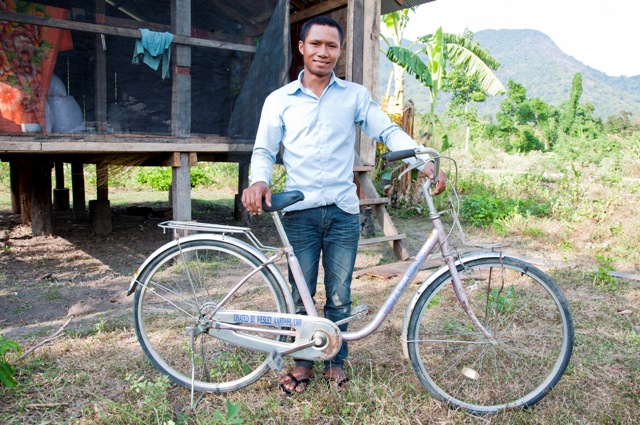Walking back and forth from home to Ponleu Thmei Primary School in his village along a 2 km soil road, which usually turns muddy in the rainy season and dusty in the hot season, Sim Sanh, oldest child from a poor family of seven, faced many challenges in his study. However, Sanh, who started his first grade late at the age of nine in 1998, overcame the challenges and every endeavor he has made for six years in his childhood, he at last successfully completed his primary school level.
|
|
|
|
|
|
But, new challenges for Sanh arose. He had to travel 43 km from his house in Chreav village, Amleang commune in Thpong district of Kampong Speu province to a high school in Anlong Chrey village, Prambeimum commune of the same district if he wanted to get higher education.
Having seen his strong commitment to continue his study at a high school level, in 2004, his parents sold a pig and some chickens and took the money to buy an old bicycle for him to ride to school. The bike cost 100,000 riels ($25).
Sanh said that he spent two and a half hours riding his old bike from his house to school along the bushy-sided and bumpy soil road. Given the security reason and time consumption for traveling, his aunt allowed him to stay at her house located 2 km from the school. The offering made him feel secured to go to school on time and regularly. And Sanh rode back to his home village only on the weekends, twice or thrice per month, in order to help his parents to do some farm work. But, he had to leave home for school at half past four every Monday morning or on Sunday at half past three in the afternoon.
However, his bike last only four years. In 2008 while he was in grade 10, he said, he was in two minds about dropping out of school. The hindrance made him concerned about his wish to become a teacher in his village.
In 2009, under the generous donation from Mr. Wesley Aardahl from North Dakota, LWD distributed 72 second-hand bicycles for disadvantaged school children in the rural areas across its six program areas in Kampong Speu, Kampong Chhnang, Pursat and Battambang provinces. Each area got 12 bicycles. Sanh was one among 72 selected children who were on the list to get one each.
Sanh said he was so excited to get a new bike from LWD at that time. The gift motivated him to commit further to complete the senior high school level. In 2010, he graduated high school. But, he didn’t stop at that. Soon, he submitted his application form to the provincial department of education for the position of junior high school teacher. But, he couldn’t make it. Then, he decided to apply for a lower position of primary school teacher and finally, he succeeded.
He was then sent for a 2-year professional training at a pedagogy school in Kampong Speu town, some 90 km from his home village. To get to the school, he had to ride his bike to a taxi station located 18 km from his home village and then take the taxi with his bike. Sanh said that as the school was very far from home, he was allowed to stay at the school and he visited his parents only once or twice a month.
In July 2012, Sanh graduated and was assigned to teach at the primary school in his village. “October 1” was the most exciting day for him—it was his first day of teaching. Now, Sanh became a teacher. “I feel very happy because I achieved my aspiration, and I am so proud of myself that I have helped teach children, as well as develop human resource in my village,” he said.
“I would like to deeply thank LWD and its donors for helping my family as well as other poor children in the village,” he said.
Wesley Aardahl has started to donate bicycles for disadvantaged rural school children since 2007. His generous gesture originated from his exposure visit to learn about LWD’s activities, especially the support for education sector in rural areas. The challenges of rural poor students he found inspired him to commit to help. In 2012, he donated 72 more bicycles.



